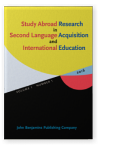Albert, Ágnes, Boglárka Spissich & Kata Csizér
2022.
Külföldi tanulmányutak és egyéni különbségek.
Magyar Pedagógia 122:2
► pp. 89 ff.

Arvidsson, Klara, June Eyckmans, Alexandra Rosiers & Fanny Forsberg Lundell
Borghetti, Claudia
2016.
Intercultural education in practice: two pedagogical experiences with mobile students.
Language and Intercultural Communication 16:3
► pp. 502 ff.

Chen, Shu & Kwan Yie Wong
2022.
Assessment of Preservice Music Teachers’ Multicultural Personality: Multicultural Music Education Perspective.
Frontiers in Psychology 13

Day, Michela & Cathy Hampton
2020.
The words to say it: student-led exploration of students’ written responses to the year abroad experience. In
Perspectives on the year abroad: a selection of papers from YAC2018,
► pp. 77 ff.

De Costa, Peter I., Hima Rawal & Irina Zaykovskaya
2017.
Introduction: Methodological diversity and innovation in study abroad research.
System 71
► pp. 1 ff.

Dewaele, Jean-Marc & Livia Dewaele
Genkova, Petia
2022.
Intercultural Competence and Studying Abroad: Does Studying Abroad Influence the Promotion of Intercultural Competence?. In
Diversity nutzen und annehmen,
► pp. 241 ff.

Genkova, Petia, Verena Fässler & Henrik Schreiber
2022.
Die Rolle von Erziehungsstilen für den Zusammenhang von Auslandsaufenthalten, Selbstwirksamkeit und interkultureller Kompetenz. In
Diversity nutzen und annehmen,
► pp. 179 ff.

Genkova, Petia & Lisa Kruse
2020.
Do stays abroad increase intercultural and general competences, affecting employability?.
Leadership, Education, Personality: An Interdisciplinary Journal 2:2
► pp. 81 ff.

Genkova, Petia & Lisa Kruse
2021.
Auslandsaufenthalt als Kompetenzschule? – Eine empirische Untersuchung der Auswirkungen von Auslandsaufenthalten auf die berufsbezogenen Kompetenzbereiche.
Gruppe. Interaktion. Organisation. Zeitschrift für Angewandte Organisationspsychologie (GIO) 52:1
► pp. 135 ff.

Genkova, Petia & Johanna Pollinger
2022.
Acculturation and Re-entry Culture Confrontation: the Case of Development Workers.
Journal of International Migration and Integration 23:2
► pp. 931 ff.

Genkova, Petia, Christoph Daniel Schaefer, Henrik Schreiber, Martina Rašticová, Jozsef Poor, Klara Valentinyi Veresné, Csilla Suhajda, Andrea Viszetenvelt & Jovana Bjekic
2021.
Scale Characteristics of Intercultural Competence Measures and the Effects of Intercultural Competence on Prejudice.
Frontiers in Psychology 12

Genkova, Petia & Henrik Schreiber
2024.
Messen interkultureller psychischer Aspekte. In
Handbuch Globale Kompetenz,
► pp. 1 ff.

Genkova, Petia, Henrik Schreiber & Verena Fässler
2023.
The role of parenting styles for the relationship of stays abroad, self-efficacy and intercultural competence.
Intercultural Education 34:4
► pp. 362 ff.

Genkova, Petia, Henrik Schreiber & Meike Gäde
2021.
Interculturality and social skills? Relationships of the stays abroad of students of different faculties with intercultural and social competence.
Journal of Community & Applied Social Psychology 31:4
► pp. 410 ff.

Genkova, Petia, Henrik Schreiber & Jan Schneider
2022.
Contacts during a stay abroad and xenophobia – duration of stay, contact quality and intercultural competence as predictors of xenophobia.
Current Psychology 41:11
► pp. 7544 ff.

Genkova, Petia, Henrik Schreiber & Jan Schneider
2022.
Je mehr desto besser? – Der Einfluss von studienorientierten Auslandsaufenthalten auf Fremdenfeindlichkeit unter Berücksichtigung der Aufenthaltsdauer, interkulturellen Kompetenz und Kontaktqualität. In
Diversity nutzen und annehmen,
► pp. 199 ff.

Goldstein, Susan B.
2022.
Intercultural Learning through Study Abroad,

Hackett, Simone, Jeroen Janssen, Pamela Beach, Melanie Perreault, Jos Beelen & Jan van Tartwijk
2023.
The effectiveness of Collaborative Online International Learning (COIL) on intercultural competence development in higher education.
International Journal of Educational Technology in Higher Education 20:1

Hardison, Debra M. & Tomoko Okuno
Harrison, J. Kline, Holly Brower & Nelson C. Brunsting
Hofhuis, Joep, Joran Jongerling, Karen I. Van der Zee, Jeroen Jansz & Sergio A. Useche
2020.
Validation of the Multicultural Personality Questionnaire Short Form (MPQ-SF) for use in the context of international education.
PLOS ONE 15:12
► pp. e0244425 ff.

IKIZER, ELIF G. & NAIRÁN RAMÍREZ-ESPARZA
2018.
Bilinguals’ social flexibility.
Bilingualism: Language and Cognition 21:5
► pp. 957 ff.

Isabelli-García, Christina, Jennifer Bown, John L. Plews & Dan P. Dewey
2018.
Language learning and study abroad.
Language Teaching 51:4
► pp. 439 ff.

Kang, Hyun‐Sook & Mark B. Pacheco
2021.
Short‐Term Study Abroad in TESOL: Current State and Prospects.
TESOL Quarterly 55:3
► pp. 817 ff.

Köylü, Zeynep
2022.
Correlational Analysis in
SLA
. In
Research Methods in Language Teaching and Learning,
► pp. 215 ff.

McKinnon, Simon
2022.
Understanding Diverse Learning Abroad Through Case Study Research. In
Designing Second Language Study Abroad Research,
► pp. 193 ff.

Pawlak, Mirosław & Kata Csizér
2022.
The impact of self-regulatory strategy use on self-efficacy beliefs and motivated learning behavior in study abroad contexts: The case of university students in Italy, Poland and Turkey.
System 105
► pp. 102735 ff.

Pawlak, Mirosław, Kata Csizér & Amy Soto
2020.
Interrelationships of motivation, self-efficacy and self-regulatory strategy use: An investigation into study abroad experiences.
System 93
► pp. 102300 ff.

Rosiers, Alexandra, Koen Plevoets & June Eyckmans
Sakurai, Yusuke
2022.
Engagement in Continuing Subject Knowledge Development: A Year After Short-Term International Courses.
Journal of Studies in International Education 26:4
► pp. 493 ff.

Van Maele, Jan, Basil Vassilicos & Claudia Borghetti
2016.
Mobile students’ appraisals of keys to a successful stay abroad experience: hints from the IEREST project.
Language and Intercultural Communication 16:3
► pp. 384 ff.

ZALBIDEA, JANIRE, BERNARD I. ISSA & MANDY FARETTA–STUTENBERG
2022.
Brief but Mighty? Sustained L2 Learning and Perceived Psychobehavioral Benefits After Short‐Term Study Abroad.
The Modern Language Journal 106:2
► pp. 411 ff.

ÇIRAK KARADAĞ, Sevinç
2022.
Erasmus+ Öğrenci Değişim Programına Katılım ve Katılım İsteğinin, Bazı Demografik Değişkenler ve Kişilik Özellikleri Yönünden İncelenmesi.
Cukurova University Faculty of Education Journal 51:1
► pp. 321 ff.

[no author supplied]
2021.
What Are the Various Areas of Second Language Acquisition Theory and How Do They Guide Instruction?. In
Introduction to TESOL,
► pp. 118 ff.

This list is based on CrossRef data as of 13 april 2024. Please note that it may not be complete. Sources presented here have been supplied by the respective publishers.
Any errors therein should be reported to them.
